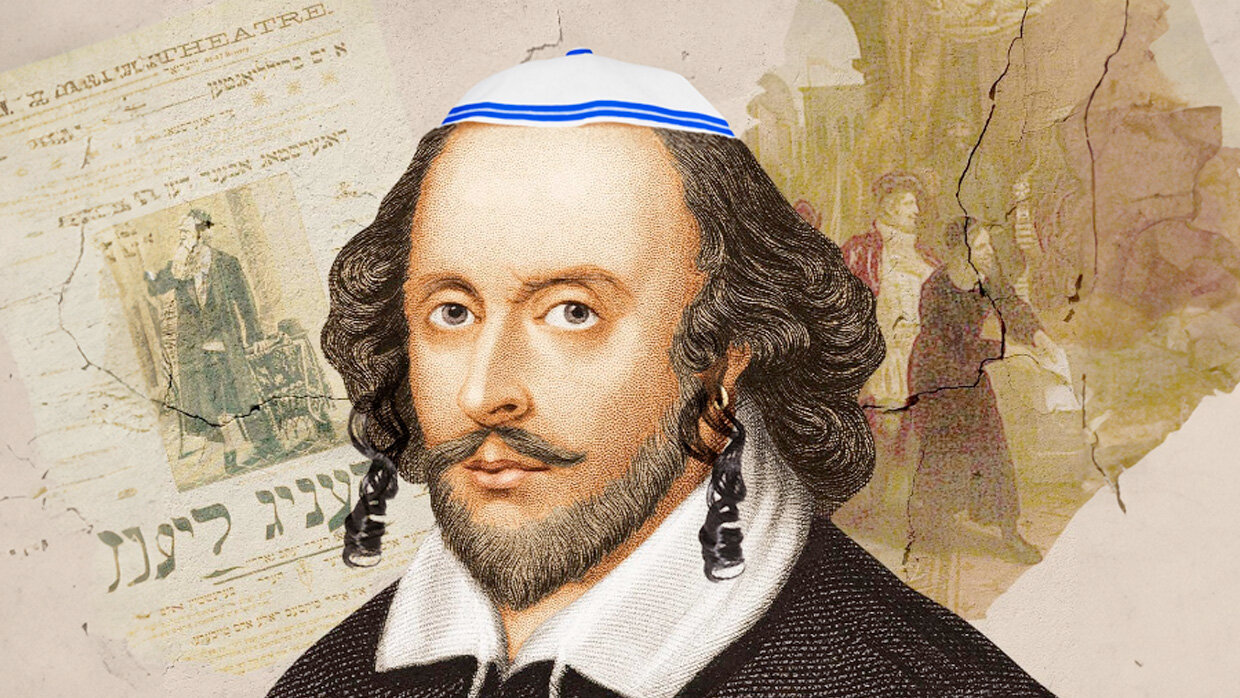Was William Shakespeare, essentially the most well-known playwright of all-time, really a trustworthy Jew?
At first look the query appears preposterous. Shakespeare is the creator of one of the crucial well-known antisemitic works of all time – The Service provider of Venice. He had his youngsters baptized and he was married and buried in a church. Throughout his lifetime, Jews couldn’t legally stay in England. That they had been expelled in 1290 and wouldn’t be invited again till 1656, 40 years after Shakespeare ‘s dying.
And but, it’s arduous to disregard the intriguing proof.
Shakespeare’s performs draw upon over 2,000 references to the Bible. Whereas Shakespeare could possibly be anticipated to know the Bible, the world’s hottest e-book, it’s evident from his writing that he was accustomed to its Hebrew model and with the Hebrew language normally. He additionally had data of the Mishnah and the Talmud, together with Pirkei Avot, Ethics of the Fathers, a Mishnaic compilation of moral teachings and maxims. Quotes from the Oral Torah seem all through his works in hidden kind. Some even declare that his performs include hints of the Zohar, Judaism’s chief mystical textual content.
Shakespeare had data of the Mishnah, the Talmud and Hebrew.
How might a gentile residing in a rustic with out Jews be accustomed to all this materials? And even when he did – why did he embrace them in his texts?
Quotes from the Mishna
Mishnaic quotes seem in some simply recognized traces, corresponding to “What’s mine is yours and what’s yours is mine,” in Measure for Measure (5:1) and “Sin will pluck on sin,” in Richard III (4:2). Whereas each traces are drawn from Ethics of the Fathers, their simplicity means that it’d simply have been a coincidence. However the line “Sin results in sin” continues in within the Mishna with “the reward for a mitzvah is a mitzvah” (4:2). This too seems in Shakespeare’s Coriolanus within the reward of Marcius, a person who “rewards his deeds with doing them,”(2:2). It then turns into evident that Shakespeare has absolutely rendered this Mishna.
The next phrases of Marcius: “You cry in opposition to the noble senate, who, underneath the gods, preserve you in awe, which else would feed on each other?” (Coriolanus, Act 1, Sc. 1) bear an in depth resemblance to Rabbi Chanina’s phrases in Ethics of the Fathers “Pray for the welfare of the federal government – for if folks didn’t worry it, an individual would swallow his fellow alive” (3:2).
Each Rabbi Hillel and Hamlet remark in an analogous method once they see a human cranium. Hamlet muses that maybe it was the cranium of a politician who thought he might “circumvent God” however is now being overruled by a lowly gravedigger. This is similar ethical of “measure for measure” drawn by Rabbi Hillel when he sees a cranium floating in a river. “Since you prompted the heads of others to drift, others prompted your head to drift.” (Ethics, 2:6)
Laurence Olivier as Hamlet
These are only some examples of the various traces of Ethics of the Fathers which Shakespeare quoted. And lest it’s surmised that Shakespeare restricted himself to those sayings which had some early Latin translations in England, we discover quite a few examples from different parts of the Mishna that had not been translated.
For instance, King Priam in Troilus and Cressida presents the Mishna’s 5 penalties to be imposed on one who injures one other. “Ship Helen, and all different injury, all honor (in Hebrew, boshet), wasted time (shevet), effort (tzaar), cash (repoui), wounds (nezek), buddies and no matter else that’s wasted on this struggle, shall be forgotten” Troilus and Cressida (2:2).
In A Midsummer Night time’s Dream, the Mishna’s Tractate Nedarim (Vows) is used to construction how Helena compares herself to Hermia. Her three standards – magnificence, equity, and top – are the exact same and in the identical order as these used within the Mishna to find out the annulment of marriage vows: “[If one vows,] ‘Konam if I marry that ugly lady,’ whereas she is gorgeous ; ‘that black[-skinned] lady,’ whereas she is honest ; ‘that quick lady,’ who’s in truth tall , he’s permitted to marry her” (Nedarim 9:10).
And the identify of Helena’s father is none apart from “Nedar”, which suggests vows in Hebrew. There’s even a Hebrew play on phrases right here, because the Hebrew phrase “nedar” additionally means “lacking” and Helena’s father is certainly all the time absent and by no means seems on stage.
After all, gentiles studying the play would utterly miss these inferences, however educated Jews would catch it.
Shakespeare’s Identify
What about Shakespeare’s identify? Certainly that does not sound Jewish.
Peter Levi, in his e-book, The Life and Instances of William Shakespeare (1986) reveals that Shakespeare’s father identify was recorded in a court docket doc as “Johannem Shakere.” In Hebrew “shaker” means “falsehood.” The phrase seems within the Ninth Commandment within the phrase, “do not be a false witness”. This will trace to Shakespeare’s id as a crypto-Jew, a secret Jew who outwardly practiced Christianity. That is particularly so when the phrase is taken into account in reference to the verse in Isaiah 63:8 “They’re my folks, youngsters who is not going to be false” (lo ye’shakeroo). As Jew residing as a Christian he would have felt he was “residing a lie”. Throughout Shakespeare’s time, if a Jew wished to stay in England the place Jews had been banished for nearly 400 years, he must undertake a false id.
The idea that “Shakere” was the unique household identify is boosted by the depiction on the Shakespeare household coat of arms – which consists of a hawk, a “saker”, shaking a spear as in “s(h)aker-spear” or Shake-speare.
Hidden Hebrew Phrases
A number of scholarly works have been written as regards to Shakespeare’s Judaism. These embrace Was Shakespeare Jewish by Ghislain Muller, Shakespeare’s Darkish Woman by John Hudson, and several other books by David Basch. One of many world’s most celebrated authors, James Joyce, even hints at Shakespeare’s Judaism in his well-known e-book Ulysses. When John Wyse Nolan reaches for his Shakespeare e-book he says, “I’ll say there’s a lot kindness within the Jew.”
And there is nonetheless extra proof. In All’s Effectively That Ends Effectively, what’s supposedly nonsense textual content proves upon nearer examination to be Hebrew. This was found by Shakespeare researcher Florence Amit. The interpreter begins his sentence to Parolles with, “Boskos vauvado” and later he says “Kerely-bonto” (4:1). Within the allegory within the play Parolles is a Jew. Fittingly, then, the “nonsense” language the interpreter seems to be talking is de facto Hebrew/Ladino. Translated the textual content additionally is smart within the context of the play. B’oz Ok’oz means “In bravery like boldness” and Vavado means “And in his surety”. And so we get: “In bravery like boldness, and in surety, I perceive thee, and might communicate thy tongue.
Equally, Ok’erli, “I’m conscious” and b’onto; his deception. Thus, “I’m conscious of his deception sir, betake thee to thy religion…”
Basch even claims that Shakespeare’s 154 Sonnets mirror the 150 Biblical Psalms. For instance, Sonnet 30’s couplet of gratitude “Once I consider you (pricey pal), All losses are restored and sorrows finish” parallels David’s Psalm 30 which equally thanks God Who “has modified my mourning into dancing.” And in Sonnet 18 we discover “Nor shall dying brag, thou wander in his shade” That is manifestly just like Psalm 23 “Although I stroll by means of the valley of the shadow of dying.”
Biblical Themes
There are additionally total Shakespeare performs primarily based on Biblical tales. For instance, The Tempest parallels the Torah’s story of Joseph and his brothers. Each Joseph and Prospero are the victims of jealous brothers upset with their particular privileges. And in each works, Joseph and Prospero find yourself exiled to a international land the place they change into its rulers. Ultimately, each protagonists conceal their true identities and replicate the circumstances of their preliminary betrayal so as to enable their brothers to make amends for his or her previous cruelty. (“The identify of Prosper, it did bass my trespass.”) Lastly, each reveal themselves to their brothers and forgive them for his or her crimes. Prospero acts “in advantage [rather] than in vengeance” (5.1.28) whereas Joseph magnanimously tells his brothers, “Don’t be distressed or really feel responsible that you just bought me into slavery” (Genesis 45:5).
Prof. Patricia Parker believes A Midsummer Night time’s Dream is an allegorical dialogue of the Roman and Jewish struggle of 66-73.
However maybe most fascinating of all is the Jewish historic allegory in Shakespeare performs – which has led to them being referred to as “Jewish revenge literature”. Prof. Patricia Parker, an knowledgeable on A Midsummer Night time’s Dream, says the play is definitely an allegorical dialogue of the Roman and Jewish struggle of 66-73 C.E and the destruction of Historical Israel. Titania, Queen of the Fairies, is a hidden reference to Titus Flavius – the Roman Common who destroyed the Jewish Temple. And Oberon, King of the Fairies, represents God. He turns into “invisible” (2:1), and the looks of the phrases “jealous” (2.1) and “Lord” (2.1), in shut succession, echo the outline in Exodus, “For I, the Lord thy God am a jealous God” (20:5).
In the meantime Backside/ Pyramus is known as the “pretty Jew” (3:1). However as a substitute of Titus beating the Jews, this time God defeats Titus. That is confirmed on the finish of the play, with the Day of Judgment, when the spirits come out of the graves and are blessed with dew. “That the graves all gaping huge, Everybody lets forth his sprite.” (5:1) “With this area dew consecrate.” (5:1) This peculiar attribute just isn’t present in descriptions of the Christian apocalypse, but it surely does seem within the Zohar: “And on the time, when the Holy One will elevate the useless to life, He’ll trigger dew to descend upon them from His head. By way of that dew all will rise from the mud . . .”
Extra references to the Roman defeat of Israel are present in Macbeth, the place the central character is a “Roman idiot” (5:8), who’s in comparison with Tarquin, ruler of Rome, who destroys “the Lord’s anointed Temple” (2:3). The truth is, the names of each Titus and Flavius seem in lots of Shakespeare performs the place theyare usually ridiculed. In Timon of Athens, Titus makes a comic book cameo look as a cursed debt collector attempting vainly to gather cash from Flavius. In Julius Caesar, Titinius stabs himself within the coronary heart (5:3) in a scene that parallels that of one other character, a clown referred to as Flavius. Some even declare that that Romeo (Rome) and Juliet (Jew) is a hidden reference to the Roman and Jewish wars.
The Service provider of Venice
If Shakespeare was certainly Jewish, how then can we clarify The Service provider of Venice – extensively thought-about one of the crucial antisemitic performs ever written? On the floor, the play is clearly antisemitic, however when one digs deeper, some consider you start to search out criticism of Christian ethical duplicity and superficiality. On the one hand they spout the virtues of mercy, whereas on the opposite, they demand the persecution of Shylock.
These commentators declare the performs true message is achieved solely by understanding that Antonio, the gentile who owes Shylock the “pound of flesh” for defaulted mortgage, is definitely a former Jew who rejected his folks for materials acquire. There are various hints to this within the play, together with a reference to Antonio as a “publican” (from the Christian Bible: Jewish tax-collectors who sided with the Roman authorities) and the repeated hints that the 2 males are “of the identical type”. With this understanding, the play turns into a struggle for Shylock to stay a Jew, whereas these round him (together with his daughter) undergo Christianity.
These commentators consider the playwright put into Shylock’s mouth a speech that comes from deep inside Shakespeare’s personal coronary heart: “I’m a Jew. Hath not a Jew eyes? Hath not a Jew arms, organs, dimensions, senses, affections, passions? Fed with the identical meals, damage with the identical weapons, topic to the identical ailments, healed by the identical means, warmed and cooled by the identical winter and summer season, as a Christian is? When you prick us, can we not bleed? When you tickle us, can we not chortle? And when you poison us, can we not die?”
Was Shakespeare a Jew? The jury remains to be out. But when his writing is any indication, it got here from deep inside a Jewish soul, craving to be free.



